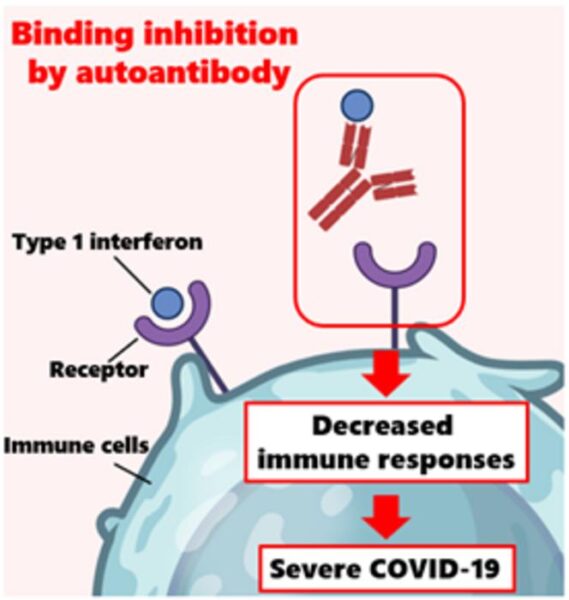Some people who experience severe COVID-19 symptoms may have auto-antibodies that block their body’s ability to fight the virus, according to a new study by researchers from Chiba University in Japan. The findings, published in the Journal of Clinical Immunology, shed light on why some patients develop life-threatening complications from COVID-19 without any obvious risk factors.
Auto-antibodies are antibodies that mistakenly target specific proteins produced by a person’s own body. In this case, the researchers found that some severe COVID-19 patients had auto-antibodies that neutralized type I interferons (t1-IFNs), which play a crucial role in the body’s defense against viral infections.
“We found that three out of 19 severe and four out of 42 critical COVID-19 patients had neutralizing auto-antibodies to t1-IFNs. Interestingly, there were no characteristic clinical features among patients with auto-antibodies to t1-IFNs,” comments Dr. Chiaki Iwamura, the study’s lead author.
Auto-Antibodies Affect Immune Cell Function in COVID-19 Patients
The researchers conducted RNA sequencing and B cell receptor analyses to understand how auto-antibodies to t1-IFNs affected COVID-19 patients. They discovered that two types of white blood cells, conventional dendritic cells and canonical monocytes, showed reduced IFN signaling in patients with these auto-antibodies.
Furthermore, B cells in these patients had fewer SARS-CoV-2-specific receptors, suggesting a decreased ability to fight the infection.
The study’s findings highlight the importance of investigating auto-antibodies to t1-IFNs more closely when facing viral epidemics. Dr. Iwamura warns, “People with auto-antibodies to t1-IFNs are more susceptible not only to SARS-CoV-2 but also to common viruses such as influenza and to unknown viruses that may emerge in the future.”
Developing Tests for Auto-Antibodies Could Help Prevent Severe Infections
The researchers hope to collaborate with companies to develop a system that can detect auto-antibodies to t1-IFNs in the blood. Ideally, this test would be included in regular health checkups, allowing people to know whether they have these auto-antibodies with little burden.
By identifying individuals with auto-antibodies to t1-IFNs, healthcare professionals could take proactive measures to protect these patients from severe viral infections, including COVID-19. As the world continues to face the challenges posed by the ongoing pandemic and potential future outbreaks, understanding the role of auto-antibodies in disease severity could be a crucial step in preventing life-threatening complications.


